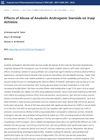PRP hair treatment is generally safe but may cause minor pain, bleeding, redness, and scalp tightness, and isn't suitable for everyone.
12 citations,
September 2014 in “Bone” A vitamin D receptor mutation causes rickets and affects immune responses.
66 citations,
October 1987 in “The Journal of clinical endocrinology and metabolism/Journal of clinical endocrinology & metabolism” Measuring androstanediol glucuronide in blood is useful for assessing and tracking treatment in women with excessive hair growth.
 1 citations,
January 2019 in “Medical principles and practice”
1 citations,
January 2019 in “Medical principles and practice” A boy's hair loss improved after tumor removal and vitamin D treatment, but hair loss returned despite normal vitamin D and no tumor regrowth.
1 citations,
January 2019 in “Indian journal of paediatric dermatology” Kids with alopecia areata had lower vitamin D levels than healthy kids.
11 citations,
October 1986 in “International Journal of Gynecology & Obstetrics” The contraceptive reduced hair growth and altered hormone levels in hirsute women.
77 citations,
October 1986 in “The Journal of clinical endocrinology and metabolism/Journal of clinical endocrinology & metabolism” Nafarelin may effectively treat excessive hair growth in women by reducing certain hormone levels.

A mix of Polygonatum sibiricum and Nelumbinis semen may ease menopause symptoms with fewer side effects.
 August 2018 in “Journal of The American Academy of Dermatology”
August 2018 in “Journal of The American Academy of Dermatology” Different treatments for skin conditions were found to be effective and generally safe, with biologics recommended as the first choice for generalized pustular psoriasis.
 4 citations,
July 2017 in “Medicine”
4 citations,
July 2017 in “Medicine” The document concludes that managing PCOS involves lifestyle changes, medication for symptoms, and weight loss for fertility improvement.
 1 citations,
May 2017 in “Journal of The American Academy of Dermatology”
1 citations,
May 2017 in “Journal of The American Academy of Dermatology” People with alopecia areata often have lower vitamin D levels than healthy people.

Finasteride reduces prostate size and PSA levels in young patients.
 March 2024 in “Revista Ciências da Saúde CEUMA”
March 2024 in “Revista Ciências da Saúde CEUMA” Testosterone increases sexual behavior in female capuchin monkeys.
August 2024 in “International Journal of Molecular Sciences” Mesenchymal Stem Cell therapy shows promise for treating hair loss in Alopecia Areata.
16 citations,
January 2017 in “DOAJ (DOAJ: Directory of Open Access Journals)” Low levels of vitamin B12 and ferritin are linked to early hair graying.
 April 2023 in “Dohuk medical journal”
April 2023 in “Dohuk medical journal” People with telogen effluvium often have much lower vitamin D levels than healthy individuals.
January 2017 in “International Journal of Trichology” Vitamin D supplements might help reduce hair fall.
 3 citations,
January 2019 in “International Journal of Trichology”
3 citations,
January 2019 in “International Journal of Trichology” The balance of thiol-disulfide in women with hair loss is affected but not damaged.
 January 2024 in “World Journal of Biology Pharmacy and Health Sciences”
January 2024 in “World Journal of Biology Pharmacy and Health Sciences” High prolactin and low vitamin D levels may be linked to hair loss in women.
January 2019 in “Menoufia Medical Journal” Lower vitamin D levels may contribute to female hair loss.
 March 2017 in “Iraqi Journal of Pharmaceutical Sciences”
March 2017 in “Iraqi Journal of Pharmaceutical Sciences” Abuse of anabolic steroids in Iraqi athletes leads to negative effects on hormones, liver and kidney function, blood sugar, and cholesterol levels.
 2 citations,
August 2020 in “Journal of Cosmetic Dermatology”
2 citations,
August 2020 in “Journal of Cosmetic Dermatology” Higher granulysin levels in the blood are linked to more severe hair loss in alopecia areata patients, and these levels decrease after effective treatment.
 October 2021 in “Dermatology Reports”
October 2021 in “Dermatology Reports” Higher IL-17A levels indicate more severe alopecia areata.
 163 citations,
November 2003 in “Journal of Investigative Dermatology”
163 citations,
November 2003 in “Journal of Investigative Dermatology” Low iron levels may be linked to some types of hair loss in women.
 73 citations,
January 2013 in “Annals of Dermatology”
73 citations,
January 2013 in “Annals of Dermatology” People with hair loss, especially those with certain types, have lower zinc levels, and zinc supplements might help.
 71 citations,
January 2014 in “Journal of Proteome Research”
71 citations,
January 2014 in “Journal of Proteome Research” Women with PCOS have different levels of certain fats and proteins in their blood, which could help diagnose the condition.
 56 citations,
January 2008 in “Dermatology”
56 citations,
January 2008 in “Dermatology” Higher iron levels in the blood are not linked to increased hair loss in women.
 44 citations,
April 2008 in “The Journal of Clinical Endocrinology & Metabolism”
44 citations,
April 2008 in “The Journal of Clinical Endocrinology & Metabolism” Women with PCOS have similar levels of certain proteins compared to women without PCOS, and these proteins don't independently cause PCOS.
 39 citations,
September 2017 in “The Open Rheumatology Journal”
39 citations,
September 2017 in “The Open Rheumatology Journal” Low serum complement levels in SLE patients don't always match with disease flares; monitoring C3 and C4 is useful, but cell-bound complement products might better indicate disease activity.
 32 citations,
August 1999 in “Journal of Investigative Dermatology”
32 citations,
August 1999 in “Journal of Investigative Dermatology” Early onset hair loss linked to genetics and androgen levels.



















